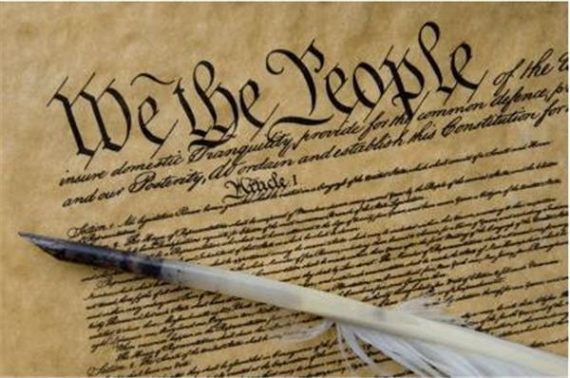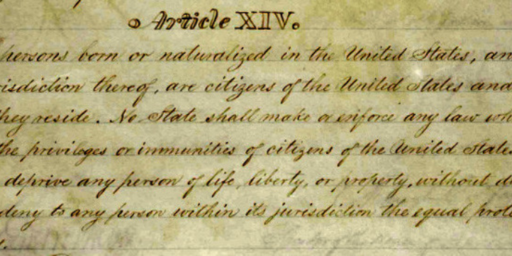POL 101: A Question about Representation
Are the interests of a given state different than the interests of the people living in that state?
 As a means of establishing a broader discussion of the topic of representation as it relates to states let me ask a simple question: in what way do you think that the interests of a state (Florida, New York, Montana—it matter not which one) are separable from the interests of the people living in that state?
As a means of establishing a broader discussion of the topic of representation as it relates to states let me ask a simple question: in what way do you think that the interests of a state (Florida, New York, Montana—it matter not which one) are separable from the interests of the people living in that state?
In other words, which of the following is true:
a) The interests of the state of Alabama = the interests of the people of Alabama.
b) The interests of the state of Alabama is somehow different than the interests of the people of Alabama.
This question is relevant to the Repeal Amendment under discussion* as well as to the notion that the 17th Amendment can be construed as somehow problematic. (It is further relevant to the notion that Washington, D.C. is some sort of entity alien and apart from the citizens of the states).
So: thoughts? And if one goes with “b” then in what way are the interests of the state are different that those of the people who lived in that state.
*Indeed, this post was inspired largely by the comment thread to one of Doug Mataconis’ recent posts and, after a fashion, to follow up on one of my older posts.





I doubt anyone would argue with the statement that the elected officials of any jurisdiction are an imperfect representation of the populace. They form a non-random subset of the population in just about every way.
With that in mind, we need to consider who it is that defines what the interests of a state are? Perhaps we could carry on a theoretical discussion of the matter, but in the real world, the interests of a state are defined by those who hold power in that state.
So I think it pretty obvious that b must be the answer – the interests of the state, as they are actually defined in the real world (by the political leaders of that state), are not the same as the interests of the people. At best they can be a fair approximation – but when you consider the evidence from public polling, you must conclude that they are more often a bad approximation.
In that light, it is interesting that the proponents of the repeal amendment seem not to have considered the possibility of allowing the people of every state to vote in a referendum on federal laws. You could do that state by state, and invalidate the law if enough states vote no, or you could just have national referenda. Personally, I think it a horrible idea, but it is interesting that the proponents would rather give this power to (surpirse) themselves – elected state officials.
I wonder what their justification for that would be – i.e. I am not questioning why they wish to impose a new veto modality on federal law, but rather why they give it to other politicians rather than the people directly.
It depends on how you define the State of Alabama. If you define a state by the people therein, there is obviously a difference. If you define a state by the government that runs it, there is a difference. All things being equal in terms of quality and cost of service, it doesn’t make much of a difference to the citizenry whether a particular service is provided at the federal or national level, but it makes a difference to the government involved.
Appointed senators represent the government of the state (to an extent). Elected senators represent the people of the state. Whether one favors or opposes a repeal of the 17th amendment is going to depend in large part on which you see as preferable. For my part, the difference is not significant enough for me to care all that much one way or the other.
Could you name some examples of the “interests” of the State of Alabama (or some other state) that you think might possibly be different from that of the people of that state?
Personally, I think it a horrible idea, but it is interesting that the proponents would rather give this power to (surpirse) themselves – elected state officials.
I’m not sure I understand this comment. Cantor is not a politician at the state level. He would n0t be among those voting to repeal laws. Indeed, it’s laws that he votes on that could be repealed.
The populations of the states are always in flux…the states themselves are not.
States != to their populations.
And how is that determined? By vote of the citizens of the state.
Of course, the interests of a given states are also always in flux. I wonder why that might be the case?
And who chose the government of that state?
Well, I don’t know where I am going with this, but I will pick B. Living in Ohio, I could probably speak for the rest of the Midwest and the Carolinas. We are mostly manufacturing and according to Robert Atkinson who was on C-span on 2 Dec 2010, “we lost 30% of our manufacturing in the last decade and this is perhaps the biggest lost of manufacturing of any country in history other than the UK”-in his words.
Governor Strickland has added more in educational programs, but that does not replace the factories of 150, 500, and 1300 that was in my town that is closed up. Having factories closed also means less in small business even though every politician says they support small business. Ohio has passed to have more casinos, and we have had extension of unemployment benefits and cash for clunkers from the federal level. I don’t think this gets to the heart of the problem. The problem is 2 billion potential cheap laborers which will put pressure on jobs and on middle class wages.
Robert Atkinson said the areas of biggest growth in the country will be the innovative and information area clusters like around Boston with Route 128 and the high tech established there. He did not put down manufacturing, but said we need more in investments and vocational training to compete globally. Small towns and rural areas will be hurt the worse. I don’t think states have the resources to compete with globalization and 2 billion cheap laborers. And that is what I have been saying all along that we have to do this at a national level with national resources and a national commitment.
I don’t think the new governor John Kasich will do much better for Ohio. A lot of talk and the same rambling and he voted our jobs to be outsourced. I can remember Bush coming to Ohio and he said that “free trade is good” while we saw the factories close. We got the tax cuts, but we lost our jobs.
Outside of warehouses on I 75 (foreign goods) and tax incentives for some manufacturing just to keep what we have, I don’t see much improvement for years to come. Small towns are screwed. Again, a national policy is needed for energy independence, for massive vocational training, and for future investments in our country and infrastructure. And I feel no one, outside of Donald Trump, Robert Atkinson, or Intel founder Andy Grove, has voiced a seriousness on what we face.
Yes, of course. My point was that the voters can express their views directly – through a system of referenda – or indirectly, through the officials that they elect. And this process of electing representatives must necessarily yield a less than perfect representation of the views of the public.
So if the new level of veto is important to you, why grant it to a different level of elected officials rather than to the people directly?
It seems to me that the government of a state has an interest in policy that is distinct from the interests of its citizens, at least insofar as the state government often has the responsibility of implementing a policy that does not fall on the shoulders of its citizens. So, for example, if Congress passes a law mandating that the states do something (or bribing them into do something) that is popular with their citizens, the state might have an interest in encouraging Congress to structure the law in such a way to not burden the state government with responsibilities such as unfunded mandates, or the state might want to have a say in the implementation of the program (particularly if state funds will be used in large part, such as in S-CHIP, Medicaid, TANF, building local roads, etc.).
Certainly the states would be more advantaged in these situations if they had representation in Congress (as presumably the pre-17th-Amendment Senate was designed to ensure, and as one presumes is the situation in Germany where the Lander still are represented in the Bundesrat) or Congress’ powers were more effectively limited (as is the parallel federal case of Canada, where much of the welfare state is built with a stronger provincial role in policy formation as well as implementation than is the case in the United States, because of the more explicit distinction in national and subnational powers in the Canadian constitution dating back to the British North America Act).
Yes, you are right about that. I was thinking of the Speaker of the House in Virginia who seems to be the guy who co-wrote the proposal, and has been its main driver. Cantor just made supportive reference to it.
<i>And who chose the government of that state?</i>
A majority or plurality of the population… in elections administered and secured by the state. Abstractly, the power of an elected government may rest with the people, but to we give them some degree of power to wield under the assumption that they can do better with it as an institution than we can do individually or collectively on our own.
Should the power of senatorial appointment be one of those powers that we give them? Or should we take on that job ourselves with direct elections? The right and wrong answer is a matter of perspective. As I said, I am pretty ambivalent on this subject.
Add the dimension of time.
The State of California will continue to exist after all of its current inhabitants are dead. (Presumably.) In the abstract then, the interests of the state are not identical to the interests of its current population.
Example? Well, that takes a bit of a reach. But let’s say that California amasses huge pension obligations that benefit the current population but impoverish future Californians . . . I know, that would never happen, but just pretend . . . then the state’s long-term welfare, its solvency, perhaps even its survival, would be at odds with its current population.
In that case a California senator might decide to defy the current electorate in order to look out for the state’s long-term survival.
Okay, that second part is too absurd even for pretend.
“Of course, the interests of a given states are also always in flux. I wonder why that might be the case?”
There may be a lag of up to four years before a new resident of state get to fully participate in its politics.
And former residents’ votes may linger for years.
Senators were never the delegates of state governments in the way members of the Bundesrat literally are. Theoretically the Bundesrat isn’t actually a chamber of the German parliament!
First of all, delegates to the Bundesrat vote by unit rule-so no split delegations. If there is a disagreement on the issue at hand among the coalition partners in a state government, for example, the delegation casts no vote. (As an aside, I think this is actually more coherent than the US situation-after all, if each Senator of a particular comes from a different party and supports a different policy, who actually “speaks for the state” at any given moment?)
Secondly, the delegations to the Bundesrat are composed of or appointed by the State executives-the correct analogy in the US situation would be if the governor of the state appointed the Senators.
Thirdly, the Bundesrat delegation changes with changes in the State government, since the incoming government appoints its own delegation-there is a direct and immediate link between the survival of state governments and the composition of the Bundesrat. Rather than the pre-Amendment US situation, where the Senator serves a fixed term, unaffected by changes in composition of the legislature at home, at least in the short-term, and is not specifically mandated by the electors who sent him to the Senate.
The most practical example I can think of is healthcare reform. Passage of the bill reflected a disconnect between the Congressional majority and both the governments of the states and the people.
The governments of the states are already floundering under increasing healthcare costs and they’re worried that the reform will further increase their burden by putting tens of thousands of additional people onto their Medicare rolls.
The people of the states appear to be split on the question. Occasionally, a narrow majority in favor has emerged but generally it’s been opposed.
Presumably, the bill passed because the people’s federal representatives saw their role differently than the people do.
I think that Cantor’s proposal is intended to counter the arrogance and the disregard of the people’s will as seen in the Obamacare passage. Representatives and Senators that don’t represent the will of the people should do it at their risk of election defeat but the people are still saddled with the bad legislation.
I like the legislature of the state being the one to veto the law. That sort of reverses the Seventeenth Amendment which I suspect if Senators were working for the state would have killed Obamacare.
And I also think it makes a big difference where the citizen is taxed and where services are provided. The closer to home the better and it eliminates the big, intrusive, powerful federal bureaucracy.
@Michael:
Yes, but, ultimately, is that the fault of some entity called California or is it the fault of the citizens of California voting for any number of ballot initiatives and politicians?
Of course, this is an issue more of responsibility than interest, per se.
@Chris:
There is little doubt that there are a variety of specific interests that infuse any number of political entities from sub-sections of the overall population to the governmental institutions themselves. But in terms of basic democratic theory, does Texas-qua-Texas mean something different than a place where all the current Texans live?
Recognizing, of course, that determining what the interests of said persons are is a tricky matter.
Steve T: Your question has shown that many on both left and right (via the comments) don’t think their gov’ts represent them, that in fact their gov’ts exist outside of them, that what ever their gov’ts do…
It is not their fault. (and it may well be so in any one case)
Don’t know if that is what you were trying to do, but the abdication of responsibility sure is instructive.
When the state legislature chose the senators, the senators had the state legislature to please, and their votes were cast toward that end or they were not senators for long. They did not campaign for contributions from people outside the state and even outside the country, and the federal government was kept in check.
When the representation was stolen away from the state legislature and votes were put up for purchase, the entire concept of checks and balances was rendered irrelevant.
The 17th is the starting place if there is ever going to be a return to Constitutional Republic. There are only two ways this can go and what you wish has no effect: either we repeal 17 and start getting things back where they should be, or we are Rome. That is all the choices there are, get it straight.
“When the representation was stolen away from the state legislature and votes were put up for purchase,”
An interesting way to characterize giving the vote to the people. I find this so amazing – the single dumbest idea in the political arena today. I urge all my political opponents to take up this cause – go tell the people that you have such contempt for them that you are going to take away their right to elect their Senators. Vote for me, and I will disenfranchise you!
Lets trust the local corrupt pols over the people.
Dude, what universe do you live in?
“When the representation was stolen away from the state legislature and votes were put up for purchase…”
I wonder how many people who agree with this also think that money is “free speech” and that corporations should be allowed to spend as much money as they like on elections…
“Dude, what universe do you live in?”
The one where you keep repeating things in the hopes that people will think it’s true, apparently.
The people already have representation in the House. Converting the Senate into a second, perverted House was necessary to take the teeth out of the 10th Amendment and allow FedGov to override the States, which of course has happened. This serves the people how, exactly?
If we want to reinstate the Constitutional Republic we have to bring the states out of the bleachers and put them back in the game fighting for their own authority, AGAINST runaway federal government, and that is done by giving them back their representatives.
I guess is comes down to the question of whether elected officials should do what their constituents want, or do what is best for them. If state legislators should be doing what the people in the state want, then (A) is true. If, however, those legislators are elected to do what is best for the residents of their state, then (B) would be true.
To give an example, the population of a state may oppose HCR on principle, even though the overall effect of the bill would be to their individual and state-wide benefit. When HCR was passed, if the people of the state opposed it, should the state legislature also oppose it? Similarly, if HCR is repealed by another federal law, and that would be bad for the people in a state, should the state legislature oppose the repeal?
But very few people have any desire to reinstate your version of a republic.
AGAINST the people, you mean. You seem to be missing the import of your position. We have a nation of free people, we have local governments elected by those people, we have state governments elected by those people, and we have a federal government elected by those people. You pretend that you are trying to push power down from the federal level to the state level, but in fact you are moving power up by taking it away from the people, and giving it to elected politicians.
But I am not going to waste much time arguing the point with you – I am just glad to see nuts like you driving the right toward such an absurd and suicidal position. Have at it…